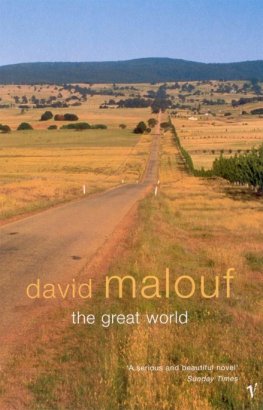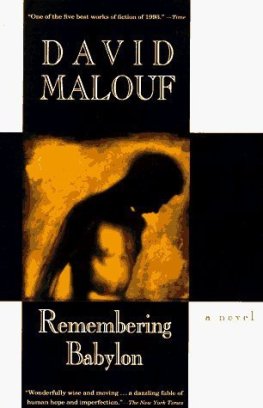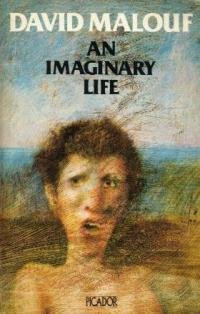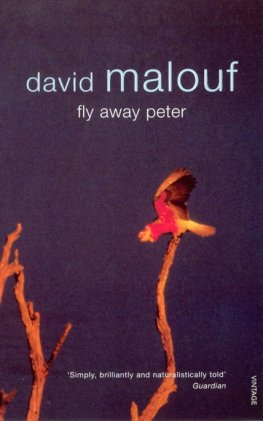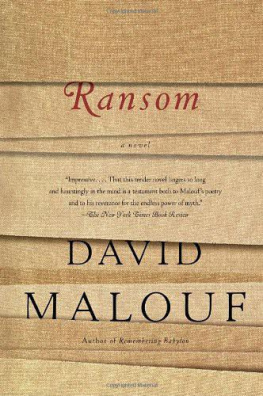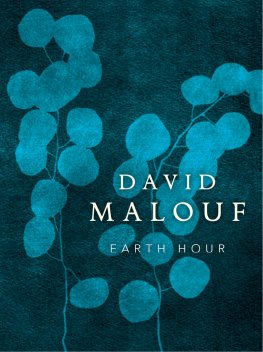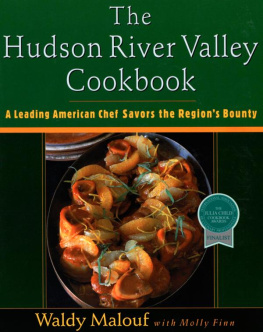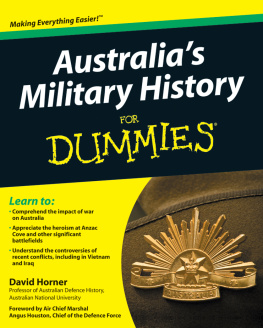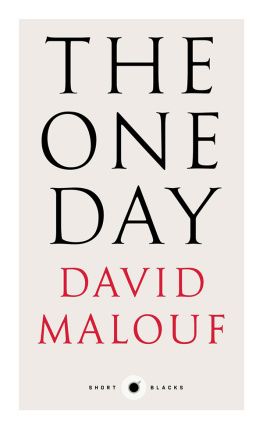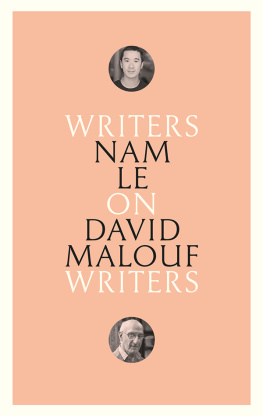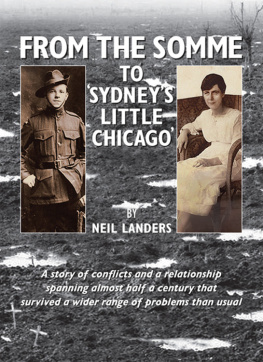David Malouf
The Great World
David Malouf is internationally recognised as one of Australias finest writers. His novels include Johnno, An Imaginary Life, Harlands Half Acre, The Great World, which won the Commonwealth Writers Prize and the Prix Femina tranger in 1991, and Remembering Babylon, which was shortlisted for the 1993 Booker Prize and won the inaugural IMPAC Dublin Literary Award in 1996. He has also written five collections of poetry and three opera libretti. He lives in Sydney.
PEOPLE ARE NOT always kind, but the kind thing to say of Jenny was that she was simple.
Children whose mothers were cooking and found they were short of something, breadcrumbs or a kilo of flour, would set up a wail at the thought of having to go down to Keens and fetch it. Aw no, mum! Why me? Its Bretts turn. Make Brett do it!
It wasnt the walk they objected to, though it was far enough, down the hill and off the main road to the river, or even the interruption to their favourite programme on TV. It was the odd feeling you got when you stood on the doorstep with the bead curtain still clattering behind you and saw the old woman half-sprawled on the counter there, breathing like a big fish that had just been hauled out of the river and stranded. Sometimes she was asleep. You would have to poke a finger into the wool of her cardigan and she would start up and look around in a wild sort of way, then, when she saw that she knew you, give a wet smile.
But simple was the wrong word for her, or so smaller kids thought, because the real thing about Jenny, as she flopped about with her thick arms and shuffly slippers, was that she was likely to say things, and do things too, that you werent expecting and could make neither head nor tail of.
They felt too a kind of doubt she raised about the order of things. She was ancient, over sixty, but grown-ups treated her as if she was six. You could tell that from the way they spoke to her.
Real children looked at Jenny Keen and she was neither a nice old lady nor a stranded fish, neither a grown-up nor another bigger kid. So what was simple about her?
She was slumped now with one elbow on the flaking sill, looking out across the yard, past the clothesline and the rotting pepper tree, to where her brother was sitting at the edge of the river, just where the bank shelved to the stream.
The river was wide, this side of it sunlit, the other in shadow. Digger had a line out and every now and then he jiggled it, but he wasnt fishing. When Digger does something he gets absorbed. The whole of him under the old felt hat is drawn to such a pitch of concentration you can feel it, she can, even at a distance; it can be frightening. What he was concentrating on now was the other fellers talk. The line was a bluff to make the talk or the listening easier.
She made a face. She pushed her tongue up under her lip and squinted. She rubbed the back of her head where the hair was hacked off short as a mans. Cmon Dig, she said out loud. Givvus a break.
The two men sat apart but had their heads together, you could see that: Digger in an old sweater that was loose at the elbows and had a couple of good-sized holes in it that she meant to mend; the other feller, Vic, in a smart-looking overcoat. He was the same age as Digger but looked younger because he took care of himself. He was always very well turned out. He sat now with his shoes, which were new and well polished, set down very carefully in the dirt. She noticed the shoes because each time he came they were different, he must have a dozen pairs.
She narrowed her eyes, trying to get the gist of what they were talking about it was the third time he had been here this week. She couldnt actually hear anything, not at this distance, but if she really put her mind to it she could sometimes pick something up. Not always. But after a minute or two, with nothing coming through, she made a huffing sound, got up, went in behind the shelves of the store into the kitchen, and took a peek at the oven.
This was more like it. Scones. Scones were her long suit. They were coming on nicely.
She went back, leaned her elbows on the linoleum of the counter, and was just beginning to get comfortable when she saw that two magpies had flapped down and were perched now on the clothesline, shifting their heads from side to side in an abrupt, interested way and keeping watch. It was the end of any consolation she might have got out of the scones.
She had a war on with the magpies. She had lots of wars, but this was her fiercest and most continuous.
Big black-and-white brutes with sharp little eyes and even sharper beaks, she hated them, and wondered really what they had been put in the world for except to be a torment to smaller creatures. They strutted about as if they owned the place and were just waiting to take over. As if they had been given control of it; to spy and patrol up and down and peck and punish. Black and white, like bloody nuns.
If she put out the baking-dish, for instance, where shed just cut up the last of a bread pudding, they would all swoop down, a dozen or more, all jostling, and the little birds, the wrens and finches, would be too scared to come near. Get away, shed yell, and kick out with her boots. This isnt for you.
But she couldnt be there all the time. She had housework to do and the shop to watch. Theyd parade about then as if the yard was theirs, yodelling, muttering their magpie rosary. Theyd sit on one of the clothesline stumps and shift their heads, following her every move. If she went out with a basketful of washing theyd go for her head, swoop and dive-bomb her the way they came down flapping and took the eyes out of baby lambs.
It was a war that had been going on for years. It was on a daily basis. Sometimes she won, sometimes they did. But there was only one of her and heaps of them, and they kept coming.
Occasionally an old feller would fall victim to one of the feral cats; or hed choke on a lump of bread, or a kid with a slingshot would get him. But before you knew it September would be round and there would be babies again, except that these babies were as big as adults and just as fierce, but black, they were born black. So there was no way in the world that you could win.
She had a war on with cats as well, the ferals, but she had inherited that one. It wasnt personal. She kept it on out of loyalty to her mother, to stop the lazy buggers from lying down and sunning themselves in the flowerbeds and flattening the plants, though there were no plants much any more, just a few straggly gerbera, a rosebush or two and a patch of mint. It was partly to make up to her mother for letting the garden go that she kept after the cats.
They were huge. When they stretched out in their matted black or grey fur they were like old felt rugs with just the red of an eye in them, that could suddenly come alive and snarl or show a claw. Garn, shed tell them, dont try that on me! Every now and then, out of habit, she would slosh a bucket of mop-water at them.
These were her open wars. The others she had to be cunning about.
The young fellers and their girls, for instance, who came into the shop just to tease and make a nuisance of themselves, picking things up and putting them down again just to aggravate. She had to stop herself from yelling at them, telling them off. Look youse, if yer gunna buy that tinna jam just buy it, dont stand there chuckin it about. But if you did that there would be trouble. For one thing, they were customers, and for another they were dangerous. They had spiked hair, green some of them, and the girls were all in black like widows, and they had earrings, even the boys did, and tattoos. How much is this? one of them would ask while another one got off with a Picnic bar or a packet of crisps. See ya, theyd call, letting the door slam, and she would shout after them Drop dead! but under her breath.

